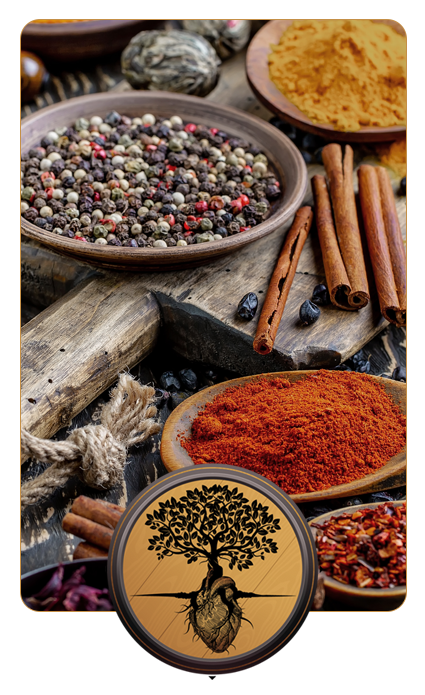Turmeric: aids in the management of oxidative and inflammatory conditions, metabolic syndrome, arthritis, anxiety, and hyperlipidemia. It may also help in the management of exercise-induced inflammation and muscle soreness, thus enhancing recovery and performance in active people.
https://www.ncbi.nlm.nih.gov/pmc/articles/PMC5664031/
Anti-Inflammatory
Turmeric has been extensively studied for its role in the regulation of RAAS (renin–angiotensin–aldosterone system) components through which it is known to exert anti-oxidant, anti-inflammatory and antihypertensive effects.
https://www.ncbi.nlm.nih.gov/pmc/articles/PMC7299138/
Ginger – Arthritis-related diseases were the most conducted studies, particularly osteoarthritis (OA). Regarding OA, six studies investigated the efficiency of the constituents of ginger that serve as anti-inflammatory agents. All studies reported improvement following ginger intake compared to the control group. For instance, Mozaffari-Khosravi et al. proposed that benefits of ginger were observed due to a reduction in the level of the proinflammatory cytokines after three months of consuming 500 mg of ginger powder
https://www.ncbi.nlm.nih.gov/pmc/articles/PMC7019938/
Turmeric and Covid 19 Management
Curcumin (just one of many components of Turmeric):
A Wonder Drug as a Preventive Measure for COVID19 Management
In the context of preventive and supportive therapy, several polyphenolic compounds extracted from natural products were identified with varied antiviral mechanisms such as targeting virus host specific interactions, viral entry, replication, and assembly. In line with these findings, curcumin, is one of the natural compounds that had been widely investigated for its antiviral effects [4]. Curcumin, exhibits wide range of therapeutic properties including antioxidant, anti-microbial, anti-proliferative, anti-inflammatory, neuroprotective and cardioprotective properties. It is reported that, curcumin exerts antiviral activities against broad spectrum of viruses including HIV, HSV-2, HPV viruses, Influenza virus, Zikavirus, Hepatitis virus and Adenovirus
https://www.ncbi.nlm.nih.gov/pmc/articles/PMC7299138/
Cinnamon extract has antiviral effects against RNA viruses. Zuang et al. showed that cinnamon extract inhibited wild-type SARS-CoV in vitro with an IC50 of 43 µM [8]. The possible proposed mechanism of action was by blocking cell entry via endocytosis.
https://www.ncbi.nlm.nih.gov/pmc/articles/P MC7146686/
Boosts Immunity
Curcumin’s antiviral and antibacterial activity was investigated, and it was shown to act against various important human pathogens like the influenza virus, hepatitis C virus, HIV and strains of Staphylococcus, Streptococcus, and Pseudomonas.
https://www.ncbi.nlm.nih.gov/pmc/articles/PMC6509173/
Cardiovascular Health
Both systolic and diastolic blood pressure reduced significant during the 1st month and this reduction was sustained throughout follow up.
https://www.ncbi.nlm.nih.gov/pmc/articles/PMC5745724/
Turmeric
https://pubmed.ncbi.nlm.nih.gov/28236605/
Clinical Use of Curcumin in Depression: A Meta-Analysis
Introduction: There is growing interest in the use of curcumin, a plant polyphenol with potent anti-inflammatory, anti-oxidant, and neuroprotective properties, as a novel antidepressant. Clinical trials have yielded conflicting conclusions pertaining to its effectiveness in depression. A meta-analysis of the topic, which has not been done until now, is therefore necessary to summarize current evidence and generate hypotheses for further research.
Results: Six clinical trials with a total of 377 patients were reviewed, comparing the use of curcumin to placebo. In patients with depression, the pooled standardized mean difference from baseline Hamilton Rating Scale for Depression. Significant anti-anxiety effects were also reported in 3 of the trials, support the significant clinical efficacy of curcumin in ameliorating depressive symptoms. Notably, no adverse events were reported in any of the trials. Most trials had a generally low risk of bias, except for an open trial of curcumin and a single-blinded study.
Post Traumatic Stress Disorder – Blast Traumatic Brain Injury (PTSD – BTBI)
Turmeric: In summary, our findings provide compelling evidence that a naturally occurring compound derived from (Turmeric) can significantly impair either newly formed or reactivated fear memories in a widely studied animal model of traumatic memory formation in PTSD. Our findings suggest that curcumin, or a derivative thereof, may hold great promise as a therapeutic agent in alleviating fear and anxiety disorders characterized by persistent, unwanted memories. https://www.ncbi.nlm.nih.gov/pmc/articles/PMC4367473/
Curcumin has been reported to modulate growth factors, enzymes, transcription factors, kinase, inflammatory cytokines, and proapoptotic (by upregulation) and antiapoptotic (by downregulation) proteins. This polyphenol compound, alone or combined with other agents, could represent an effective drug for cancer therapy.
Memory and Focus – Alzheimer’s Disease
A growing body of evidence indicates that oxidative stress, free radicals, beta amyloid, cerebral deregulation caused by bio-metal toxicity and abnormal inflammatory reactions contribute to the key event in Alzheimer’s disease pathology. Due to various effects of curcumin, such as decreased Beta-amyloid plaques, delayed degradation of neurons, metal-chelation, anti-inflammatory, antioxidant and decreased microglia formation, the overall memory in patients with AD has improved.
https://www.ncbi.nlm.nih.gov/pmc/articles/PMC2781139/
In terms of obesity-related cardiovascular risk factors, ginger was reported to be beneficial in lowering the risk factors, such as body fat mass, body fat percentage, total cholesterol, waist circumference, waist-to-hip ratio, and insulin resistance.
https://www.ncbi.nlm.nih.gov/pmc/articles/PMC7019938/









